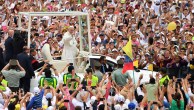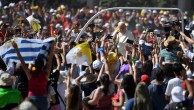Following his first visit to the United States as spiritual leader of the world’s Catholics, Pope Benedict XVI is viewed more favorably than he was a few weeks before his trip. Currently, 61% of Americans say they have a favorable impression of the pope, up from 52% in late March.
The latest national survey by the Pew Research Center for the People & the Press and the Pew Forum on Religion & Public Life, was conducted April 23-30 among 1,000 Americans; it was conducted shortly after the pope’s April 15-20 visit to Washington D.C. and New York City. The survey finds a dramatic increase in the proportion of Catholics expressing highly favorable views of the pontiff. Nearly half (49%) of Catholics say they have a very favorable opinion of the pope, up from 36% in the late March survey, conducted March 24-29. Overall, positive opinions of Pope Benedict among Catholics have risen from 74% to 83%.

For analysis of the press coverage of the pope’s U.S. visit, see the accompanying report from the Project for Excellence in Journalism and Pew Forum on Religion & Public Life, “During U.S. Papal Visit, Media Focused on the Shepherd and His Flock“.
Benedict XVI and John Paul II

Pope Benedict’s image among Catholics remains somewhat less positive than Pope John Paul II’s in 1996, after he had served nearly 20 years as pope. At that time, fully 93% of Catholics expressed favorable views of Pope John Paul II.
However, just as many Catholics now express very favorable opinions of the current pontiff as did so of John Paul II in 1996 (49%).
Pope Benedict is viewed more favorably by both Catholics who attend church regularly as well as those who do not; in fact his image has improved the most among the less observant. Among Catholics who attend church weekly or more often, 57% now give the pope a very favorable rating, up from 49% a month ago. Among those who attend less often, 41% now have a very favorable opinion of the pope, up from 25% in March.
Better Grades for Interfaith Outreach

The pope receives much better ratings than he did in late March for promoting good relations with other religions, and the change has been particularly striking among Protestants – especially white evangelical Protestants – and Catholics who attend church infrequently.
By roughly two-to-one (49%-25%), Protestants who have heard at least a little about the pope say he has done an excellent or good job in promoting positive relations with other religions. In late March, just 32% said he had done an excellent or good job in handling interfaith outreach, while 43% rated his efforts as only fair or poor.
Views of Pope Benedict’s outreach to other faiths have shown substantial improvement. Roughly half (51%) of those who have heard at least a little about the pope say he has done an excellent or good job with respect to his interfaith efforts while just 29% rate his efforts in this area as only fair or poor. In late March, the public was evenly split in assessments of the pope’s promotion of relations with other religions in March (39% excellent or good vs. 40% only fair or poor).
Opinions of Pope Benedict’s handling of the Catholic Church’s sexual abuse scandal, an issue raised by the pontiff several times during his visit, are more mixed. About half (48%) who have heard something about the pope rate his efforts in addressing the scandal as only fair or poor, while 39% say he has done a good or excellent job in this regard.
The proportion of white evangelical Protestants who say Pope Benedict has done an excellent or good job promoting in relations with other faiths has increased from 32% in March to 57% currently. White evangelicals now have somewhat more positive views of the pope’s efforts in this regard than do white mainline Protestants (57% vs. 47%); in late March, the two groups offered similar assessments of how well the pope was doing in promoting good relations with other religions.
Overall, 70% of Catholics familiar with the pope express positive views of his efforts to foster good relations with other religions, up from 64% in late March. Most of the improvement has come among less observant Catholics (up 12 points); there has been less change among highly observant Catholics (up three points), who already gave the pontiff high marks for his efforts in this area.
Pope Faulted for Handling of Abuse Scandal

Americans view the pope’s efforts to address the sex abuse scandal in the Catholic Church far less positively. Catholics express more positive opinions of the pope’s handling of the abuse scandal than do Protestants. Even among Catholics, however, only about half (49%) of those who have heard at least a little about the pope say he has done an excellent or good job in addressing the abuse scandal.
There are wide differences in opinions about the pope’s handling of the abuse scandal among highly observant and less observant Catholics. Highly observant Catholics, by a margin of almost two-to-one (60% to 33%), give the pope a positive assessment on this issue. Less observant Catholics are more critical of the pope’s handling of the sex abuse scandal; a plurality (48%) says he has done only a fair or poor job, while 38% rate his efforts positively.
Among Protestants, white evangelicals rate the pontiff’s handling of the church’s sex abuse scandal more positively than do white mainline Protestants. Nearly half of white evangelical Protestants (45%) who have heard at least a little about the pope say he has done an excellent or good job in dealing with the scandal, compared with 32% of white mainline Protestants.
Views of Pope’s Ideology Unchanged
While overall impressions of the pope have improved over the course of the past month, there has been little change in the public’s assessment of Pope Benedict XVI’s ideological leanings. Nearly half of Americans (47%) say he is conservative, a number virtually unchanged from 45% in late March. Notably, somewhat more highly observant Catholics view the pope as conservative than did so in late March (71% vs. 62%). There has been a smaller change in the views of less observant Catholics; 55% currently view him as conservative compared with 53% in late March. Among Protestants, 42% say Pope Benedict is conservative, up from 34% in late March.
About the Survey
Results for this survey are based on telephone interviews conducted under the direction of Princeton Survey Research Associates International among a nationwide sample of 1,000 adults, 18 years of age or older, from April 23-30, 2008. The following table shows the error attributable to sampling that would be expected at the 95% level of confidence for different groups in the survey:

In addition to sampling error, one should bear in mind that question wording and practical difficulties in conducting surveys can introduce error or bias into the findings of opinion polls.
About the Projects
This survey is a joint effort of the Pew Research Center for the People & the Press and the Pew Forum on Religion & Public Life. Both organizations are sponsored by the Pew Charitable Trusts and are projects of the Pew Research Center, a nonpartisan “fact tank” that provides information on the issues, attitudes and trends shaping America and the world.
The Pew Forum on Religion & Public Life delivers timely, impartial information on issues at the intersection of religion and public affairs. The Forum is a nonpartisan organization and does not take positions on policy debates. Based in Washington, D.C., the Forum is directed by Luis Lugo.
The Pew Research Center for the People & the Press is an independent opinion research group that studies attitudes toward the press, politics and public policy issues. The Center’s purpose is to serve as a forum for ideas on the media and public policy through public opinion research. In this role it serves as an important information resource for political leaders, journalists, scholars, and public interest organizations. All of the Center’s current survey results are made available free of charge.
This report is a collaborative product based on the input and analysis of the following individuals:
Pew Forum on Religion & Public Life Luis Lugo, Director Sandra Stencel, Deputy Director John C. Green, Senior Fellow in Religion and American Politics Gregory Smith, Research Fellow Dan Cox, Research Associate Allison Pond, Research Associate Tracy Miller, Copy Editor
Pew Research Center for the People & the Press Andrew Kohut, Director Scott Keeter, Director of Survey Research Carroll Doherty and Michael Dimock, Associate Directors Kim Parker, Senior Researcher Juliana Menasce Horowitz, Robert Suls, Shawn Neidorf, Leah Christian and Jocelyn Kiley, Research Associates Kathleen Holzwart, Research Analyst James Albrittain and Alec Tyson, Research Assistants
Photo Credit: AP




